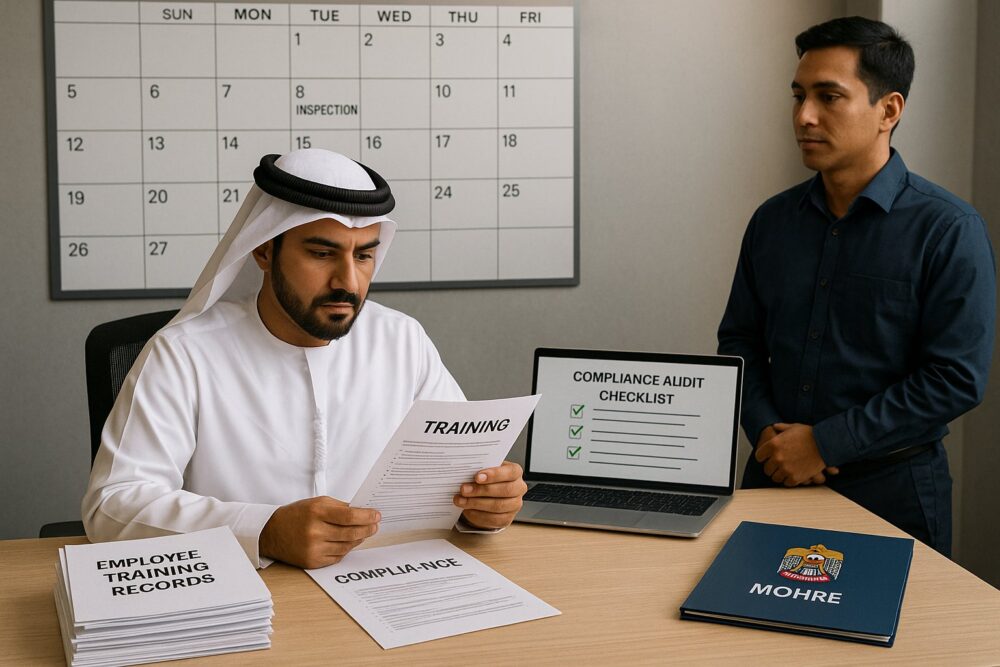UAE employee training laws are a cornerstone of the country’s workforce development strategy, ensuring employees receive proper preparation for their roles, safety responsibilities, and professional growth. These regulations mandate structured training programs across all sectors, aiming to improve competency, workplace safety, and productivity.
For HR professionals, compliance officers, and business owners, understanding these laws is crucial. Non-compliance can lead to significant fines, operational restrictions, and reputational damage. More importantly, compliance builds a stronger, more capable workforce aligned with the UAE’s economic vision.
UAE Employee Training Laws: Compliance Requirements
Overview of UAE Employee Training Laws
UAE employee training laws: The UAE has developed a comprehensive legal framework requiring employers to implement professional development, skills enhancement, and safety training. The Ministry of Human Resources and Emiratization (MOHRE) oversees implementation, monitoring, and enforcement. Developments for key.
UAE labor laws: The laws apply to all industries, with sector-specific rules for healthcare, construction, financial services, and education. Individual emirates may also set additional requirements for licensing and permits.
Key Training Categories

Workplace Safety Training
General Safety Orientation: All new employees must undergo safety orientation within 30 days of joining.
Job-Specific Safety: Specialized training on equipment, job risks, and hazard management.
Annual Refreshers: Updated training to reflect regulatory changes and incident learnings.
Supervisor Safety Training: Additional courses for managers on compliance monitoring and investigations.
Professional Development key developments for
Core Skills: A minimum set of annual training hours based on job category and seniority.
Technology Skills: Digital tools, cybersecurity, and workplace tech usage.
Language & Communication: For multicultural teams and customer-facing roles.
Leadership Training: For supervisors and managers to improve team performance.
Compliance & Legal Awareness
Labor Law Training: Covering employee rights, company policies, and grievance procedures.
Anti-Discrimination & Harassment: Mandatory sessions with annual refreshers.
Data Protection: Training on privacy laws and safe data handling.
Documentation & Record Keeping
Employers must maintain clear, accessible records to prove compliance with UAE employee training laws. This includes:
Annual Training Plans: Documenting objectives, methods, and assessment criteria.
Schedules & Curriculum: Approved by relevant authorities when required.
Employee Records: Participation logs, performance in assessments, and certificates.
Skills Assessments: Regular evaluation to identify training needs.
Compliance Reports: Monthly and annual reports for internal and regulatory use.
Sector-Specific Requirements
Healthcare
Ongoing clinical competency updates.
Mandatory patient safety and infection control training.
Certification for use of medical technology.
Construction & Manufacturing
Certified training for heavy machinery and hazardous material handling.
Fall protection and industrial risk management.
Financial Services
Anti-money laundering (AML) and customer due diligence.
Cybersecurity awareness and fraud prevention.
Training Delivery Standards
Approved methods include:
Instructor-led classes with certified trainers.
E-learning platforms with interactive modules and assessment tracking.
On-the-job training with supervised skill application.
Blended learning combining theory and practice.
UAE employee training laws: Training providers must be accredited, and instructors must hold recognized qualifications. Regular evaluations ensure program quality.
Assessment & Certification
Competency verification is a key requirement under UAE employee training laws:
Written tests and practical demonstrations confirm learning outcomes.
Certification processes document employee readiness.
Periodic revalidation maintains compliance and skill relevance.
Compliance Monitoring & Penalties

MOHRE conducts:
Scheduled inspections to verify documentation and delivery quality.
Random audits including interviews with staff.
Investigations following complaints or reported non-compliance.
Penalties for violations range from fines to operational restrictions, suspension of business licenses, or public disclosure of non-compliance cases. the private sector.
Implementation Strategies for Businesses
To comply with UAE employee training laws, organizations should:
Conduct a needs assessment to identify skills and compliance gaps.
Develop a training plan aligned with legal and industry standards.
Integrate a learning management system (LMS) for tracking and reporting.
Allocate budgets and resources to ensure consistent delivery.
Engage stakeholders including managers and employees in the process.
Future Trends in Training Requirements
Emerging trends suggest expansion in:
Digital literacy and AI skills for modern workplaces.
Sustainability and environmental awareness training.
Mental health and wellness education.
Cross-cultural communication for the UAE’s diverse workforce.
Technology adoption will also increase, with virtual reality simulations, microlearning, and blockchain credential verification becoming common.
Conclusion
Compliance with UAE employee training laws is more than a legal obligation it’s a strategic investment. Well-trained employees perform better, remain safer, and contribute to business growth. Organizations that integrate compliance into their training culture gain a competitive advantage, protect their workforce, and uphold the UAE’s vision for a skilled, future-ready economy.
By implementing structured training, keeping accurate records, and staying updated with regulations, businesses can ensure they not only meet the law but also exceed it building a culture of excellence that benefits both employees and employers.

